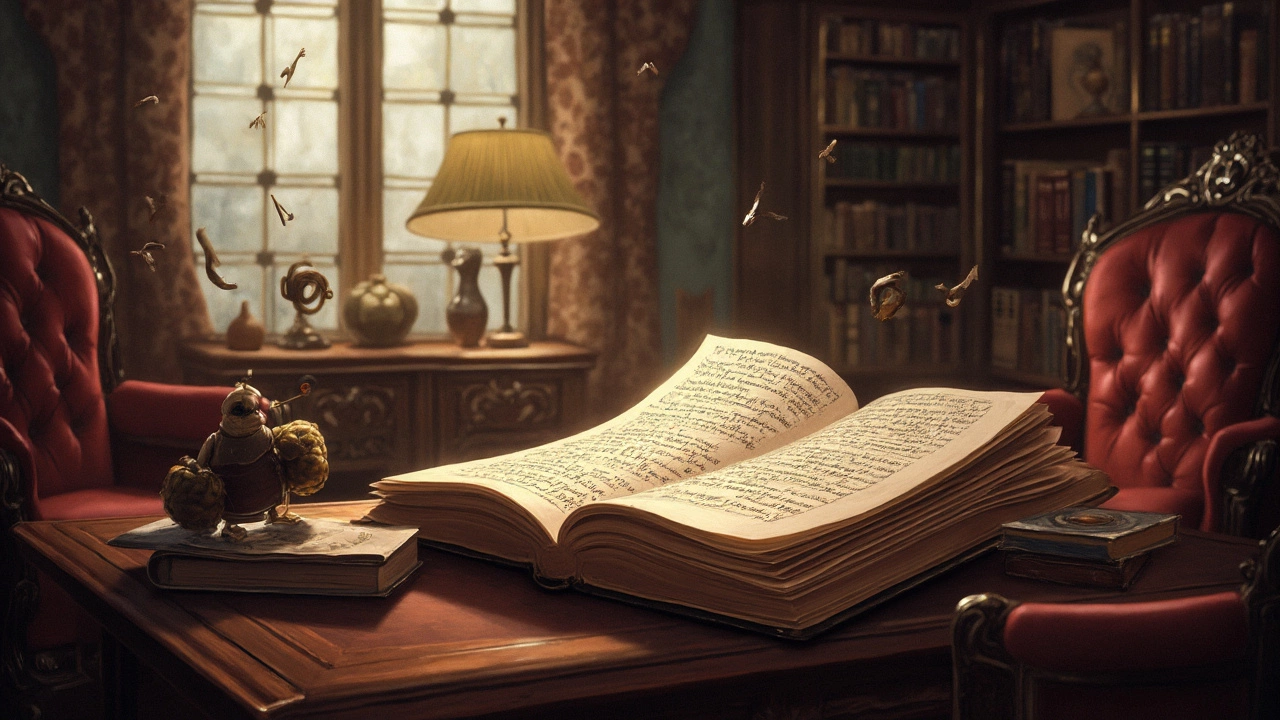Exploring the Plural of Daddy: An Insightful Guide
 Mar, 15 2025
Mar, 15 2025
Ever found yourself wondering how to pluralize 'daddy'? You're not alone! Plurals in the English language can sometimes be tricky, especially with words that have emotional or familial connections. Let's dissect this mystery together and find the best way to express more than one 'daddy' in a sentence.
First off, the plural form of 'daddy' is 'daddies.' It's pretty straightforward, following the regular pattern for turning words ending in 'y' to 'ies.' But, of course, there's always a bit more to the story, especially in the rich and sometimes confusing tapestry of English grammar.
English is filled with terms where plurals aren’t as intuitive. Think about words like 'baby' becoming 'babies,' or 'city' turning into 'cities.' In the same way, when you need to talk about multiple dads, whether it's in the context of a Father's Day event or a school project, 'daddies' is your go-to choice.
- Understanding Plurals in English
- The Plural Form of Daddy
- Similar Words and Their Plurals
- Common Mistakes to Avoid
- Practical Tips for Usage
- Fun Facts and Trivia
Understanding Plurals in English
English plurals can feel like a maze at times. But don't worry, you're far from alone in this. Plurals generally involve adding an 's' or 'es' to the word's end. Easy, right? Well, that's until you hit words like 'child,' which becomes 'children,' or 'ox,' which turns into 'oxen.' Tricky stuff, but that's what makes English interesting!
Regular vs Irregular Plurals
The good news is that most English words follow regular plural rules. You simply tack on an 's' or 'es.' Take 'dog' for instance—its plural is 'dogs.' With words ending in 's,' 'sh,' 'ch,' 'x,' or 'z,' you add 'es,' like 'box' turning into 'boxes.' But here's where it gets funky—irregular plurals. Words like 'mouse' become 'mice,' and no, there's no adding 's' here. It's just English doing its thing.
The Rule of 'Y'
When it comes to words ending in 'y,' guess what? You usually swap the 'y' for 'ies.' So 'puppy' becomes 'puppies,' just like 'daddy' becomes 'daddies.' But hold on—if there's a vowel before the 'y,' like with 'toy,' you simply add an 's' making it 'toys.' Cool trick, right?
Quick Tips for Mastering Plurals
- When in doubt, try saying it out loud. Often, your ear can catch the correct plural form.
- Keep a list of tricky plurals handy for reference.
- Practice makes perfect. The more you write, the easier it gets.
Still scratching your head over plurals? You're not alone. The English language is a living thing, constantly evolving. Keep exploring, stay curious, and remember, even native speakers sometimes trip up!
The Plural Form of Daddy
When it comes to making words plural, English loves to keep us on our toes, and 'daddy' is a perfect example. At first glance, the plural form, 'daddies,' seems simple enough, following the well-known rule for words ending in 'y.'
Generally, to make nouns that end in a consonant followed by 'y' plural, we change the 'y' to 'ies.' So, 'daddy' becomes 'daddies.' This follows the same pattern as a few other common English words like 'baby,' which becomes 'babies.' It's a basic rule but vital to grasp if you want your writing to look and sound correct.
The Rule in Action
Here's a quick breakdown of how this works:
- Daddy → Daddies
- Baby → Babies
- City → Cities
But watch out! Not every word ending with 'y' follows this rule. Words where 'y' follows a vowel like 'journey' become 'journeys,' not 'journeies.' Tricky, right?
When Do You Need More than One Daddy?
Using the plural form of daddy isn't just for fun. You might need it when discussing multiple father figures or in storytelling. Say you're writing about a class event celebrating dads, and you have to refer collectively to everyone's fathers. Such situations call for 'daddies' instead of saying 'dads' or 'fathers,' which could miss that personal touch everyone loves about the word 'daddy.'
So, whether you're writing children's books, humorous tales, or just leaving a note for your kids' school project, knowing how and when to use the correct plural form shows your command of the English language. This small detail can make a big difference in your communication.
Similar Words and Their Plurals
If you've ever scratched your head trying to figure out plurals for words like 'daddy,' then you're in good company. English is full of words where the plural isn't immediately obvious, and getting them right is a great way to boost your language skills.
Let's kick things off with some other family-related words. When we look at a word like 'mommy,' the plural follows the same pattern as 'daddy,' turning into 'mommies.' Similarly, 'nanny' becomes 'nannies.' It's a simple rule of thumb: if a word ends in a consonant followed by 'y,' swap the 'y' for 'ies' to make it plural.
Beyond Family Terms
It’s not just familial terms that follow this pattern. Consider 'puppy,' which turns into 'puppies,' or 'story,' transforming into 'stories.'
- Puppy: Puppies
- Story: Stories
- Lorry: Lorries
While it may seem simple, these rules have exceptions. Words like 'day' become 'days,' since they don't end with a consonant+y. English loves to keep us on our toes!
Fun Fact Table
| Word | Plural Form |
|---|---|
| City | Cities |
| Party | Parties |
| Diary | Diaries |
Understanding these little tricks and exceptions makes navigating the English language a bit easier. One less riddle on your grammar journey!

Common Mistakes to Avoid
When it comes to the plural form of daddy, even the best of us can stumble. Let's iron out those wrinkles so you can confidently write or speak about multiple father figures without a hitch.
Mixing Singular and Plural Forms
This is a classic slip-up. It's easy to get tangled up and mistakenly combine 'daddy' and 'daddies' inappropriately. For example, saying "two daddy" instead of "two daddies" or "those daddy" is a quick way to confuse your message.
Apostrophe Misuse
Apostrophes have a bad reputation for causing trouble in plurals. Remember, 'daddy's' with an apostrophe indicates possession, not plurality. It's a huge distinction. Forgetting this often leads to sentences that don’t make sense, like "The daddy's were there" when you mean to talk about multiple dads.
Overthinking the Rule
English is famous for its exceptions, but in the case of 'daddy', it follows the regular rule for converting 'y' to 'ies.' Overthinking and second-guessing the rule could lead to concocting incorrect versions like 'daddys.' Stick to what you know: 'daddy' becomes 'daddies.'
Contextual Confusion
Pay attention to the context. You might be thinking about multiple fathers in a family, a group of dads at a school meeting, or even different dads in a book series. Each scenario might tempt you to change your wording, but 'daddies' remains correct across these contexts.
A Quick Example Table
Here's a handy table that summarizes the correct and incorrect plural forms to solidify what we've covered:
| Correct Usage | Incorrect Usage |
|---|---|
| daddies | daddys |
| daddies are coming | daddy's are coming |
| the group of daddies | the group of daddy |
By keeping an eye out for these common errors, you'll be well on your way to mastering the plural of 'daddy,' and maybe even surprising others with your linguistic prowess!
Practical Tips for Usage
When it comes to using the plural form of daddy, context is key. It's not just about grammar; it's about making sure your message is clear and relatable. Here are some practical tips to help you get it right.
1. Context Matters
Think about where and why you're using the plural. If you're referring to multiple fathers in a storyline, like in a sitcom scenario or a Father's Day celebration, the context should guide how you use 'daddies'. Make sure your audience understands why there's more than one daddy in your narrative.
2. Matching the Tone
The word 'daddies' often comes with an informal or light-hearted tone. So, if your writing is formal, consider using 'fathers' instead. But if your piece is playful or personal, like a blog discussing family life, then 'daddies' fits perfectly.
3. Using Lists or Examples
- In storytelling: "The two daddies at the parent's meeting had contrasting opinions."
- In events: "Bring all daddies for a special Father's Day brunch!"
4. Visual Clarity
When writing about multiple fathers, it can get confusing. If you're using 'daddies' frequently, consider ways to visually differentiate between individuals. Example: Daddy John and Daddy Mike. This helps maintain clarity in your writing.
5. Keep It Simple
Don't overthink it! The plural form might sound unusual if you're not accustomed to using it, but remember, 'daddies' is just about as straightforward as it gets when following basic grammar rules.
With these tips, using the plural form of daddy in your writing should feel more intuitive. Whether it's for storytelling, event planning, or simply making your language more dynamic, these insights will help you stay on track.
Fun Facts and Trivia
Let's spice things up with some interesting tidbits about the word 'daddy' and its plural form. Did you know that the term 'daddy' has roots that go back centuries? It comes from 'dad,' an affectionate form of address for a father, and has been widely used in English-speaking cultures.
Evolution and Usage
The word 'daddy' has not only been a staple in everyday language but also in popular culture. Songs, movies, and books often depict father figures with this endearing term. In fact, a famous example is the song "Daddy Cool" by the 1970s band Boney M, which became a massive hit worldwide.
Plurals Aren't Always Plural
In some contexts, like grammar discussions or academic texts, you might encounter 'daddies' used in a seemingly singular sense. This happens when talking about different types of parental figures across cultures, where 'daddies' represents different kinds of fatherly roles rather than just more than one dad.
Statistics on Father's Day
Father's Day celebrations often highlight daddies of all kinds! Did you know?
| Country | Date Celebrated | Estimation of Father's Gifts (in millions) |
|---|---|---|
| USA | Third Sunday in June | ~$20 billion |
| Australia | First Sunday in September | ~$750 million |
People often spend significantly more on Father’s Day than on other parental holidays, emphasizing the special place daddies hold.
Common Misconceptions
Folks often assume 'daddies' is an informal or incorrect term. On the contrary, it’s perfectly acceptable and grammatically correct—as long as it's used in the right context.
So, next time you’re writing that heartfelt note or a card, feel confident using the plural form, knowing you’ve got your grammar game on point!